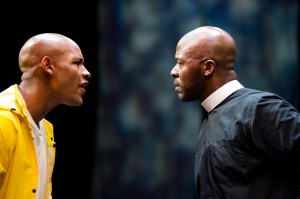 Standing mid-aisle, Bruh Preach (Curtis Mclaren) breaks the fourth wall and gazes on us. He raises his arms above his head and speaks: “For our present troubles are quite small and won’t last very long. Yet they produce for us an immeasurably great glory that will last forever!” He lowers his arms to his sides. At that moment, I realize he has given us a benediction. The audience has been transformed; no longer theatergoers , we are churchgoers. So ends the play.
Standing mid-aisle, Bruh Preach (Curtis Mclaren) breaks the fourth wall and gazes on us. He raises his arms above his head and speaks: “For our present troubles are quite small and won’t last very long. Yet they produce for us an immeasurably great glory that will last forever!” He lowers his arms to his sides. At that moment, I realize he has given us a benediction. The audience has been transformed; no longer theatergoers , we are churchgoers. So ends the play.
When we first meet him, Preach is fleeing a mugger. He escapes, staggers into his Southside Chicago church – the same one he has pastored since 1963 (it is now 1996) – and collapses, wheezing to the ground. This is where his wife, First Lady (Lizan Mitchell) finds him. This is it for her; a sign they must move on. After tending to his injuries, she lectures, “You drove me to this choice … we on a sinkin’ ship and neither of us knows how to swim.” She’s sick of the neighborhood violence, the declining congregation, and the fact they aren’t young enough anymore to deal with any of it.
But Preach is stubborn; he must see the church through. Much the same is his attitude toward his gay son Israel (Jonathan Dent). Being from a generation where ‘gay’ meant happy and nothing else, Preach believes Israel to be living with a grave sin. He’s grappling for his son. The son grapples back. They want to reconnect and yet there is a chasm between them that religion won’t let either of them cross.
Much of the play deals with this relationship between father and son, but a good portion is also given to how this affects the mother and her son’s lover, Blood (“not Mr. Blood, just ‘Blood’”), a devilish hood whose watchwords are “I can fix anything.” This is played fiendishly well by Jude Sandy who stills his movements, throwing intensity from his eyes.
In the liner notes, playwright Marcus Gardley likens Gospel to a loose retelling of Jesus’ story combined with events from this own personal life. This may be a stretch when one considers the appearance of a mentor/lover, a drag queen named Bubbles (John the Baptist?), but I believe this is in part what Gardley means by loose. By and large, Gardley manages to make a statement about homosexuality and the church (particularly the black church in America) while asking us questions about our own journey for freedom and what it means.

